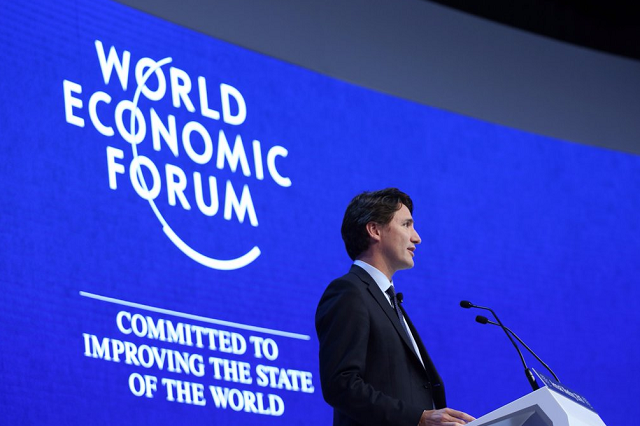It’s all happening over in Davos, Switzerland, as the World Economic Forum hosts its 2016 Annual Meeting. As The Economist mused earlier in the week, ‘The scope for Davos satire is boundless: billionaires fretting about inequality; legions of personal assistants scheduling meetings about automation; and Bono’. Highlights so far include remarks from the US Vice President Joe Biden; a conversation between Fareed Zakaria and Israeli PM Benjamin Netanyahu; and an incredibly optimistic presentation from Canadian PM, Justin Trudeau. The theme of this year’s confab is ‘the fourth industrial revolution’, with FT nominating the four big issues to be automation, China, emerging markets and the Brexit. But at the end of the day, the uninvited and unwelcome guest intruding on this year’s meet is the significant degree of uncertainty borne of a gloomy economic outlook. Here are some snaps from the event so far.
To mark 25 years since the start of Operation Desert Storm, The Atlantic have pulled together a photo essay capturing the mood on the streets of the US and on the ground in Iraq and Kuwait. 2016 also marks 100 years since Sykes Picot; head over to The Strategy Bridge for a consideration of the agreement’s implications.
The Taliban, or its offshoots, have claimed responsibility for two horrific attacks that took place on Wednesday. The first, a suicide bombing in Kabul, essentially fulfils a threat made by the terrorist group last October to treat the country’s ‘satanic [television] networks’ as ‘military objectives’. The Diplomat looks at how the Taliban are attempting to justify the attack by branding the victims as a foreign intelligence network rather than journalists.
The second attack took place at Bacha Khan University in northern Pakistan, just over a year since the horrifying Peshawar school attack which led to the deaths of 148 people, predominantly children. The Guardian asks why terrorist groups are increasingly targeting schools, colleges and universities. And Foreign Policy carries a piece which argues that Pakistan should build more schools to counter the negative effects of Taliban attacks on education in the country’s Federally Administered Tribal Areas.
CSIS this week released a major study on the Obama administration’s rebalance to the Asia–Pacific, which considers US strategy, force posture, capabilities and partnerships across the region. Catch up with the report launch event here.
During his time in power, Xi Jinping has broken the record for being China’s most jet-setting president. However, until Tuesday of this week, he hadn’t set foot in the Middle East. There’s been no shortage of analysis on what to expect from his high profile visit; The Wall Street Journal has deemed ‘jockeying between Iran and Saudi Arabia’ for Chinese favour as likely, while CNBC has indicated that Xi’s meetings will focus on foreign policy as well as One Belt One Road. For some background reading, check out this report from Chatham House (PDF), which asks whether China might seek to fill a ‘geopolitical vacuum’ left by the US’ gradual withdrawal from the Middle East. Alternatively, the English language version of the Chinese government’s ‘Arab Policy Paper’, which is the first of its kind and offers some context to Xi’s visit, was released earlier this month.
And finally, in another resounding triumph for both North Korea and communism, The Pyongyang Times revealed this week that the DPRK has invented a hangover-free alcohol that’s a hit with both ‘experts’ (in what field remains unclear) and ‘lovers’ alike. Foreign Policy, who were unfortunately unable to reach the hermit kingdom’s experts and lovers for comment, reported that the liquor, which ‘exudes national flavour’, gets its unique tang from ginseng and scorched rice.
Video
Chatham House has released a chat between (27 mins) of Mark Malloch-Brown and Jonathan Prentice, both of the International Crisis Group, where they discuss the ten most prominent crises to watch in 2016.
Podcasts
In case you missed it, The ABC’s Richard Fidler last year invited former war correspondent for Time and CNN, Michael Ware, to discuss Daesh creator Abu Musab al-Zarqawi and his stunning documentary ‘Only The Dead’. The Brisbane-born Ware pulled the doco together using footage he’d shot with a hand-held camera at the time of the invasion of Iraq in 2003. Highly recommended for Ware’s enlightening thoughts of the Middle East, war and journalism.
Artificial intelligence has been high on the agenda across the last few days in Davos. FT’s Murad Ahmet sat down with Erik Brynjolfsson of the MIT for a short discussion on the sidelines of the Forum. Take a listen here.
Events
Canberra: Whip out your diaries quickly, because this event is unmissable. David Kilcullen—former senior advisor to General Petraeus and author of the Quarterly Essay ‘Blood Year’—will speak at ANU’s Bell School on 22 February, focusing on the errors of governments and militaries in this new chapter of the War on Terror.
